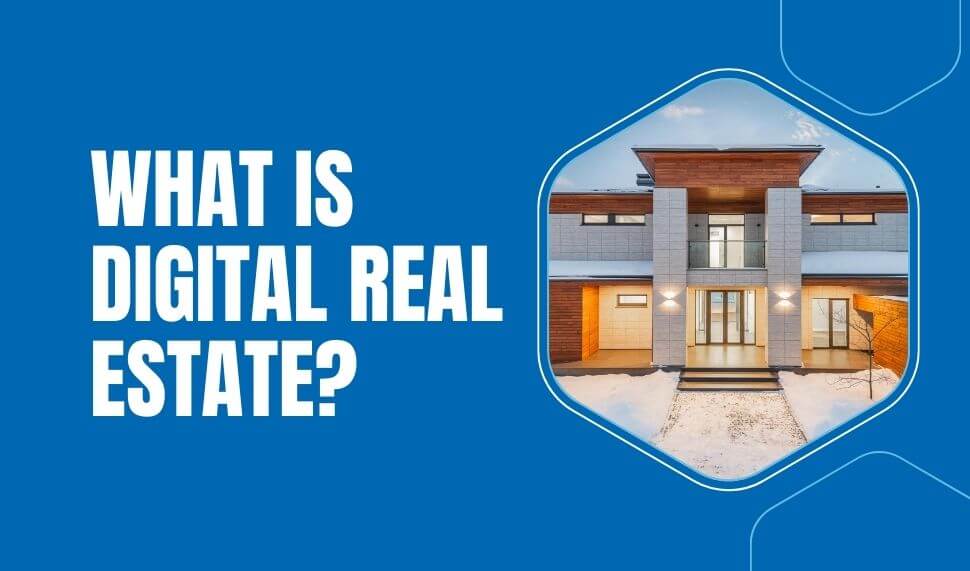Digital real estate investing is a new and exciting opportunity for investors looking to get exposure to the real estate market in the digital realm. As our lives increasingly migrate to the online world, digital real estate has emerged as a way to own and monetize virtual land and property. According to CNBC.Com, in an interview [2022], Andrew Kiguel, CEO of Toronto-based Tokens.com, said that digital real estate prices have hiked up to 400% to 500%.
Do you know? In 2023, the Global Metaverse Real Estate market was only valued at a million USD. However, it is growing at an unexpected Compound Annual Growth Rate (CAGR) and is expected to reach a multimillion-dollar value by 2032. In this article, I will talk about what is digital real estate and how you can invest in it, including potential benefits and strategies for building a successful digital portfolio. Let’s embark on this journey together.
What is Digital Real Estate?
Digital real estate refers to the ownership and management of online properties and assets that generate passive income. It is a valuable asset in the digital world. These digital assets can take many forms, including domain names, websites, social media accounts, and other digital assets that act as virtual business locations or serve a commercial purpose. Like traditional real estate, digital real estate can be bought, developed, rented, or sold for profit.
The Emergence of Digital Real Estate
The concept of digital real estate has gradually taken shape over the last decade in tandem with the growth of online engagement. While the Internet dates back to the 1960s, it wasn’t until Web 2.0 and the rise of social media, smartphones, and apps in the 2000s that people started spending a major chunk of their daily time online.
As internet usage soared, savvy entrepreneurs realized that owning attractive online destinations could be hugely profitable. Domain names and websites for specific sectors saw a spike in demand and value, followed by platforms like YouTube, Instagram, and TikTok that allowed ordinary individuals to build huge audiences and essentially “homestead” new virtual land.
The COVID-19 pandemic greatly accelerated the demand for digital real estate as more work, schooling, and shopping shifted online. Today, hundreds of millions of people conduct their lives mainly on the Internet, which opens up rewarding opportunities for those who own prime digital properties.
What are the Benefits of Digital Real Estate Investing?
In the fast-paced digital landscape, having a strong online presence is crucial for businesses and individuals. The benefits of digital real estate investing are lower early costs and lower obstacles compared to traditional real estate. Owning strategic digital assets can enhance your visibility, credibility, and profitability. Here are some benefits of investing in digital real estate:
- Global Reach
- Growth Potential
- Diversification
- Lower Startup Costs
- Passive Income Potential
- Flexibility
- Scalability

Global Reach: Digital properties have a global audience that is easily accessible to anyone in the world with an internet connection. By investing in digital real estate, you can tap into this global audience and expand your reach beyond geographical limitations. This can lead to higher potential profits.
Growth Potential: If the metaverse and digital worlds continue growing in popularity, digital real estate could dramatically increase in value over time, just like premier real-world locations. Getting in early means huge growth potential.
Diversification: Investing in digital real estate is not correlated to traditional investments such as stocks and bonds. This means that adding digital real estate to your portfolio allows you to spread risk and potentially increase your overall returns on investment.
Lower Startup Costs: Compared to starting a brick-and-mortar business, digital real estate requires relatively less capital and resources. This accessibility makes it easier for individuals and small businesses to enter the market and establish an online presence.
Passive Income Potential: Once the online asset is established and optimized, it can continue to generate passive income with minimal ongoing effort or maintenance, even when you are not actively working on it. And if you invest timely in the digital land and sell it at the highest value point it will maximize the ROI.
Flexibility: Managing digital real estate provides flexibility in terms of work hours and location. Many tasks can be managed from anywhere worldwide, allowing for greater freedom and creating a better work-life balance.
Scalability: Digital businesses can be scaled up more quickly than physical real estate by leveraging technology and automation. With the right strategies, you can expand your digital presence to reach global audiences and increase your earnings.
What are the Types of Digital Real Estate?
Digital real estate encompasses various online assets that hold value and can be bought, sold, or leased. Here are some common types of digital real estate properties:
Websites and Blogs: Websites and blogs are foundational digital real estate properties. Just like prime location physical properties command higher prices, websites that have authority with established audiences, traffic, and strong search engine rankings command higher selling prices. Websites can be monetized through:
- Advertising – display ads, affiliate programs
- Subscriptions – paywalls, memberships, premium content access
- Information products – ebooks, online courses, coaching programs
- Merchandise – branded physical products
- Services – consulting, bookings, etc.
Websites built specifically to earn money through methods like Google Adsense are referred to as income websites. Popular website builders and CMS platforms include WordPress, Wix, and Squarespace.
Social Media Accounts: Popular social media platforms like Facebook, Instagram and TikTok have billions of users. Accounts with a large number of engaged followers can be monetized by promoting brands and products as social media influencers. Niche meme accounts, brand accounts, and influencer accounts have been valued and sold for thousands of dollars based on metrics like follower count.
Blogs: Blogs are websites focusing on written content, and the best ones build significant traffic and loyal audiences over time. Top blogs leverage Google AdSense as well as affiliate marketing and advertisement deals. Blog topics like fashion, travel, food, parenting and technology have thrived.
Domain Names: Domain names ending in popular extensions like .com and .net can be purchased and invested in like real estate. Domain names related to high-value keywords and brands can appreciate significantly and be sold for profits. Additionally, parked domain names can display pay-per-click ads via services like Google Domain Parking.
Pro Tip: Investing in a quality domain name can be the foundation of a successful online presence.
Mobile Apps: From gaming apps to social networking, mobile apps have become a massive digital industry. Besides monetizing through ads and in-app purchases, popular mobile apps can be sold to interested buyers for lump sums and even ongoing royalties.
YouTube Channels: YouTube channels with a large subscriber base and consistent viewership are extremely valuable digital assets. Besides monetizing through YouTube’s Partner Program for ad revenue sharing, YouTube channels also leverage brand sponsorships, affiliate marketing, and merchandise sales.
Amazon Businesses: Online marketplaces like Amazon allow regular folks to sell products and manage an ecommerce business with very little startup costs. Profitable Amazon businesses built on the FBA model can be sold for 5 to 6 figures.
Email Newsletters: Building a subscriber list and sending regular email newsletters is a time-tested digital real estate model. By providing value to subscribers, you can eventually monetize the list through promotions and advertising. Selling email newsletters with thousands of engaged subscribers is common.
Online Courses & Info Products: Creating online courses on popular topics and platforms like Udemy and Skillshare has become a profitable digital real estate model. Informative products delivered digitally like ebooks, PDF guides, audiobooks, etc. can also generate passive income streams when sold online. People buying digital property in metaverses are generally the same as they do in physical real estate. So as a digital real estate investor, you could use these platforms to gain real-time insights on the latest trends before investing in them in real life.
Evaluating Digital Real Estate Investments
As with any other investment, proper due diligence is required before buying digital real estate assets to generate income. Some key factors to evaluate are:
Traffic Metrics: Number of visitors, page views, subscribers, and followers based on niche. Assess growth potential.
Revenue Stats: Current monthly/yearly revenues. Evaluate diversified monetization strategies.
Valuations: Fair market value based on comparable sales and multiples like monthly earnings.
Online Authority: SEO metrics like keyword rankings and backlinks. Measures trust and brand equity.
Audience Analysis: Visitor demographics and engagement metrics. Assess customer loyalty.
Technical Aspects: Website speed, security, site architecture. Review app specifications.
Legal Elements: Trademarks, copyrights, licensing deals. Verify intellectual property ownership.
Thorough technical, financial, and legal vetting is recommended before buying websites, apps, and other digital assets.
How Do You Make Money on Digital Real Estate?
There are a lot of digital real estate opportunities for everyone. By making a digital real estate strategy you can make a huge profit on a virtual properties platform. Here are some of the most common ways to invest in digital real estate:
Buying Existing Assets: You can buy popular existing websites, apps, and other digital properties in marketplaces like Flippa. Well-established websites with steady earnings generally sell for 24 to 36 times their monthly profits. Apps, social media accounts, and Amazon FBA businesses can also be purchased.
Building New Assets: You can build digital assets yourself like creating websites and apps, establishing an affiliate marketing site, or launching a YouTube channel in a niche. While more time intensive, you control the asset and can potentially achieve higher valuations long term.
Investing in Digital Companies: Investing in tech companies like social media platforms and digital content sites before they go public provides exposure to their growth. Equity crowdfunding allows investing in startups. Real Estate Investment Trusts (REITs) offer exposure to digital infrastructure assets.
Domain Name Investing: You can buy domain names containing keywords related to trends, brands, and niche interests, and sell them later at a profit. Parked domain names can also earn a passive income stream through pay-per-click ads.
Peer-to-Peer Lending: You can invest in loans backed by digital assets like websites, apps, and social media accounts on P2P lending platforms. This provides periodic income and a return of the principal on maturity.
You may also like to read real estate investment strategies for beginners.
How to Invest in Digital Real Estate for Beginners?
Digital real estate is a profitable and exciting investment opportunity, but it also requires diligence, research, and ongoing effort. It is important to take your time, do your due diligence, and start with a small investment if you’re new to this type of investment. Here are some steps on digital real estate for beginners that will help you get started

Research and Educate Yourself: Before getting into digital real estate, it is important to understand the digital real estate market and its potential benefits and risks. Read books, articles, and educational resources on the topic to gain insights into different investment strategies and trends. If you’re new to digital real estate investing, seek professional advice.
Identify Your Investment Goals: Determine your investment objectives, whether you’re looking for short-term profits or long-term passive income. Knowing your goals will help you make informed decisions and narrow down your options and avoid overspending.
Choose a Niche: Select a niche that you want to invest in or where you have expertise. This could be anything from e-commerce, content websites, affiliate marketing, or online services. It’s often easier to succeed in a niche that you understand well.
Purchase and Optimize Digital Assets: Once you’ve identified opportunities, acquire the digital assets. Register domain names through domain registrars, buy existing websites from marketplaces, or acquire virtual real estate through platforms and optimize digital assets by implementing SEO strategies. This includes keyword research, on-page optimization, and quality content creation.
Monetize the Asset: Explore different monetization strategies such as advertising, affiliate marketing, sponsored content, e-commerce, or selling digital products. Develop a revenue generation plan that aligns with your investment goals and the nature of the asset.
Track and Improve Performance: Digital real estate investments require ongoing monitoring and improvement. Stay updated with industry trends, algorithm changes, and new technologies. Regularly track the asset’s performance, address any issues, and identify opportunities for growth and diversification.
Scale and Diversify: As you gain experience and generate profits, consider scaling your digital real estate portfolio. Acquire additional assets, diversify into different niches, or explore new opportunities to maximize your returns.
You may also like to read real estate investing tips for investors.
How Much Does Digital Real Estate Cost?
The cost of digital real estate in the virtual world can vary greatly depending on several factors. Such factors are the platforms, the locations, the types of digital property, its audience size, and its revenue potential.
Here are the potential costs for common types of digital real estate:
Domain Names: Generally, a domain name costs from $2 to $20 a year. However, depending on factors such as the length, relevance, and popularity of the domain name, it will cost from a few dollars to millions of dollars. Short, memorable, and highly relevant domains are considered premium which command high prices in the resale market.
Virtual Real Estate: The costs of virtual real estate in the Metaverse can be very steep. However, sometimes Metaverse real estate prices can vary depending on such as location within the virtual world, types and sizes of virtual property, and its demands.
Digital Assets: Similarly, other digital assets like well-known websites with high authority, social media accounts, and apps can also be considered digital real estate and their prices can vary depending on traffic flow and follower count.
What are the Risks of Investing in Digital Real Estate?
Despite the huge potential of digital real estate, investors should be aware of the considerable risks involved before investing. Proper risk management is vital with any investment in digital real estate or NFTs. The risks associated with it are as follows:
Highly Speculative: Digital real estate remains largely unproven, raising doubts about long-term viability.
Platform Collapse: If the underlying metaverse fails, virtual real estate loses significance.
Volatility: Large price swings make digital real estate risky in the short term.
Hacking and Theft: Blockchain technology is still early and vulnerable to hacking, theft, and scams.
Lack of Regulation: This emergent market is wholly unregulated, leaving little investor protection.
Tax Uncertainty: It’s still unclear how profits on virtual property get taxed.
Loss of Keys: Losing passwords to wallets holding NFTs results in permanent loss of assets.
Follower Loss: Influencers and creators tied to certain NFTs can lose relevance.
Final Thoughts on Digital Real Estate Investing
Digital Real Estate is not just a trend. It’s a dynamic and profitable avenue for investment. Whether you’re a seasoned investor or just starting, understanding and leveraging digital real estate can be a game-changer. So, make the most of your digital real estate and watch your online presence flourish.
If you are wondering about the solutions to property management, get in touch with property management OKC today! We are a local, best property management company in OKC that understands the needs of property owners. With years of experience, we have a deep understanding of the local real estate market in Oklahoma City, OK.
FAQs About Digital Real Estate
Is digital real estate a legitimate investment opportunity?
Yes, digital real estate is a legitimate and rapidly growing investment opportunity. As the world becomes increasingly digital, the demand for virtual spaces and online assets continues to rise, presenting lucrative opportunities for those willing to invest in this emerging sector.
How much does it cost to invest in digital real estate?
The cost of investing in digital real estate can vary greatly depending on the type of asset and the scale of the investment. Some digital assets, such as websites or online courses, can be created with minimal upfront costs, while others, like virtual real estate or established e-commerce stores, may require more significant capital investments.
Do I need technical expertise to invest in digital real estate?
While having technical skills can be beneficial, it is not an absolute requirement for investing in digital real estate. Many successful digital real estate investors outsource technical tasks or leverage user-friendly platforms and tools to create and manage their online assets.
How do I protect my digital real estate investments?
Protecting your digital real estate investments involves implementing security measures like secure hosting, regular backups, and robust cybersecurity protocols. Additionally, it's important to protect your intellectual property rights through trademarks, copyrights, and legal agreements.
Can I invest in digital real estate from anywhere in the world?
Yes, one of the advantages of digital real estate is its global accessibility. As long as you have an internet connection, you can invest in, manage, and profit from digital real estate assets from anywhere in the world.

Author
Scott Nachatilo is an investor, property manager and owner of OKC Home Realty Services – one of the best property management companies in Oklahoma City. His mission is to help landlords and real estate investors to manage their property in Oklahoma.
 (
(









